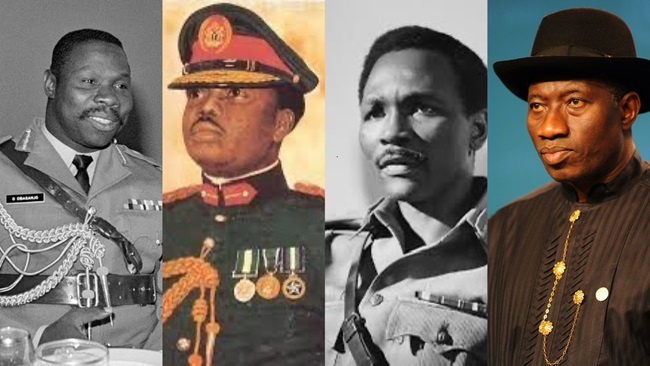Nigeria has had a long and complex political history, with several leaders stepping up to lead the nation. Interestingly, some of these leaders (either as Heads of State or President) were relatively young when they assumed the highest office in the country.
This article lists the youngest presidents in Nigeria’s history according to records and historical data of Nigerian Leadership and the impact they left on Nigeria.
1. General Yakubu Gowon
General Yakubu Gowon is the youngest president in Nigeria’s history. Born on October 19, 1934, Gowon became Nigeria’s Head of State at 31 after a military coup in 1966.
Despite being very young, Gowon led Nigeria through one of its most challenging periods: the Nigerian Civil War (1967-1970). His presidency lasted from 1966 to 1975, during which he worked towards the country’s reunification after the war. He is remembered for introducing the National Youth Service Corps (NYSC) as part of his efforts to unify the nation.
2. General Murtala Mohammed
Another young leader who made his mark in Nigeria’s history was General Murtala Mohammed. Born on November 8, 1938, Murtala became Nigeria’s president at 37 following a military coup in 1975.
Although his time in office was brief (he served for only 200 days before his assassination in 1976), Murtala is remembered for his bold reforms and anti-corruption policies. His leadership laid the foundation for economic and government reforms that were continued after his sudden death.
3. General Olusegun Obasanjo
Born on March 5, 1937, Olusegun Obasanjo became Nigeria’s Head of State at the age of 39 following the assassination of General Murtala Mohammed in 1976. He served as military leader from 1976 to 1979 and is credited with successfully transitioning Nigeria back to civilian rule.
Obasanjo’s youthful leadership and ability to stabilize the country after Murtala’s death earned him national respect. Years later, Obasanjo returned to lead the country as a democratically elected president from 1999 to 2007.
Read Also: EXPLAINER: Why Nigerian presidential aircraft was seized
4. Goodluck Jonathan
Goodluck Jonathan became president following the death of President Umaru Musa Yar’Adua. Although not as young as some other leaders, Jonathan was still relatively youthful by modern standards. Born on November 20, 1957, he was 52 when he assumed office in 2010.
Jonathan’s presidency lasted until 2015. He is notable for his focus on economic reforms, education, and overseeing Nigeria’s first peaceful transfer of power from one political party to another.
5. Shehu Shagari
Shehu Shagari, born on February 25, 1925, was Nigeria’s first executive president. He became president at the age of 54 in 1979 and led the country for four years until a military coup ousted him in 1983.
Shagari’s presidency focused on improving education and infrastructure, but General Muhammadu Buhari’s coup cut short his tenure.
The youngest presidents in Nigeria’s history showcase how age does not limit leadership capabilities. Leaders like General Yakubu Gowon and Murtala Mohammed demonstrated strong leadership and made impactful decisions despite being relatively young when they assumed office.
WATCH TOP VIDEOS FROM NIGERIAN TRIBUNE TV
- Let’s Talk About SELF-AWARENESS
- Is Your Confidence Mistaken for Pride? Let’s talk about it
- Is Etiquette About Perfection…Or Just Not Being Rude?
- Top Psychologist Reveal 3 Signs You’re Struggling With Imposter Syndrome
- Do You Pick Up Work-Related Calls at Midnight or Never? Let’s Talk About Boundaries







